|
|
|
Sort Order |
|
|
|
Items / Page
|
|
|
|
|
|
|
| Srl | Item |
| 1 |
ID:
144340
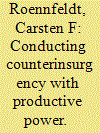

|
|
|
|
|
| Summary/Abstract |
Western governments tend to see power as synonymous with coercive force when they use their military forces in irregular armed conflicts abroad. Yet experiences from recent conflicts like Afghanistan and Iraq suggest that this understanding of power is unable to deliver the desired political ends. In an effort to better analyse and engage the political dynamics that dominate such conflicts, this article points to productive power. This theoretical perspective focuses on the micro-political dynamics that create legitimacy and mobilise people, which seminal counterinsurgency doctrines hold to be the goal.
|
|
|
|
|
|
|
|
|
|
|
|
|
|
|
|
| 2 |
ID:
145973
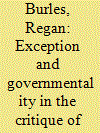

|
|
|
|
|
| Summary/Abstract |
This article investigates the relation between exception and governmentality in the critique of sovereignty. It argues that the problem of sovereignty is not only expressed between the accounts of sovereignty that exception and governmentality articulate, but also within each of those accounts. Taking Michel Foucault and Carl Schmitt as the paradigmatic theorists of governmentality and exception, respectively, this article engages in close readings of the texts in which these concepts are most thoroughly elaborated: Security, Territory, Population and Political Theology. These readings demonstrate that the spatiotemporal expression of the problem of sovereignty within exception and governmentality renders these concepts indistinguishable from one another in terms of their relation to the boundaries of political order. Schmitt and Foucault’s accounts of sovereignty should thus not be read as opposites, but as expressions of the limits of modern political authority. Efforts to develop a critique of sovereignty through typologies of exception or governmentality are bound to reinstantiate the spatiotemporal limits expressed by the principle of state sovereignty.
|
|
|
|
|
|
|
|
|
|
|
|
|
|
|
|
| 3 |
ID:
182654
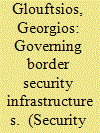

|
|
|
|
|
| Summary/Abstract |
This article explores the maintenance of large-scale information systems that are used for, among other purposes, border security in the European Union. My argument is that information systems do not always operate according to their design scripts. They materialize as unruly, unstable and failing infrastructures that are governed through maintenance in order to correct any identified functional anomalies and address potential future failures by adapting them to emerging technologies and the service needs of end-users (e.g. border guards, police). To conceptualize the maintenance labour through which information systems are governed, I synthesize ideas developed in Michel Foucault’s work on biopolitics and governmentality with contributions that explore the agentic forces and proclivities of technoscientific matter. By unearthing the very mechanics of maintenance processes, I make two contributions to the literature that interrogates the digitization and smartening of border security. First, I demonstrate that attending to maintenance permits a more complete understanding of the agency of information systems. Second, I broaden the research agenda that explores border security as practice by directing attention towards the often invisible, but politically significant, labour of maintainers who, by rendering information systems functional, sustain the power to govern international mobility by digital means.
|
|
|
|
|
|
|
|
|
|
|
|
|
|
|
|
| 4 |
ID:
124617
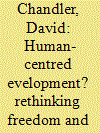

|
|
|
|
|
| Publication |
2013.
|
| Summary/Abstract |
Today's dominant discourses of international development increasingly focus on human agency as the measure of development in terms of individual capabilities. The individualised understanding of development takes a 'human-centred' or 'agent-orientated' view of the barriers to development. This article seeks to critically engage with the view of the human and of human agency articulated within this approach. In this discourse, development is taken out of a macro-political-economy context, in which development policies are shaped by social and political pressures or state-led policies. Foucault's insights on the rearticulation of power - shifting from the state-based, sovereign and disciplinary approaches of government ruling over society, towards the biopolitical or 'human-centred' approaches of governance through social processes - will be used to critically engage with the capabilities approach. This article genealogically draws out the changing nature of Western discourses of development and the understanding of policy practices as promoting the empowerment of the post-colonial other in order to examine how development and autonomy have been radically differently articulated in discourses of Western power and how today's discursive framing feeds on and transforms colonial and early post-colonial approaches to the human subject.
|
|
|
|
|
|
|
|
|
|
|
|
|
|
|
|
| 5 |
ID:
170191


|
|
|
|
|
| Summary/Abstract |
Drawing upon ethnographic data collected from fieldwork among a reading-based community in a coastal city over 10 years, and Michel Foucault’s notion of the cultivation of an ethical self, the primary aim of this study is to examine three issues: (1) how do middle-class citizens articulate and practise the cultural activities that they advocate?; (2) are their practices simultaneously individualized and totalized in the way that Foucault demonstrates?; and (3) do these internally oriented practices have civic significance?
|
|
|
|
|
|
|
|
|
|
|
|
|
|
|
|
| 6 |
ID:
174260


|
|
|
|
|
| Summary/Abstract |
This paper examines Mahmoud Darwish's exploration of the political, geographical, existential, and metaphysical dimensions of displacement, banishment, and statelessness in his 2005 lyrical epic “Exile.” The paper offers an analysis of Darwish's treatment of dialectic, heteroglossia, the juxtaposition of the national and the existential, and conflicting temporalities, as well as political uncertainty and metaphysical fear. With particular reference to the paradoxical portrayal of space in “Exile”—the juxtaposition of the near and far, real and illusory, localized and dispersed—I also examine the ways in which Palestinian identity, as narrated in this poem, is destabilized and dispersed by what Michel Foucault calls “heterotopic space.”
|
|
|
|
|
|
|
|
|
|
|
|
|
|
|
|
| 7 |
ID:
108061
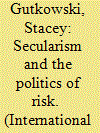

|
|
|
|
|
| Publication |
2011.
|
| Summary/Abstract |
Little has been said in the international relations (IR) literature so far about the connections between secular ideas and identification of risk. However, there are striking parallels. 'Western', secular discourse(s) have framed Islamist terrorism as slippery, uncontainable, mysterious and strange. Similarly, risks are often described as 'diverse, amorphous and qualitative'. Starting from this observation, this article explores connections between ongoing conversations about the politics of risk and insights from the emerging literature on secularism and international politics. Using the British 'Prevent' agenda of 2005-09 as a case study, it asks how it is that political secularism and cultural secularity have contributed to perceptions of danger emanating from the Muslim population. It explores the potential implications of these perceptions for state security policy. The article also explores Foucault's account of pastoral governance as a potentially useful framework for scholars of risk, particularly for describing the ambivalence inherent in much risk-management practice.
|
|
|
|
|
|
|
|
|
|
|
|
|
|
|
|
| 8 |
ID:
171976


|
|
|
|
|
| Summary/Abstract |
There is no question that China is ahead of many developed countries in the digitalization of both its society and surveillance systems. It is also clear that the new technologies made possible by this digitalization — the widespread use of smart ID cards, the Great Firewall, the accumulation of Big Data, the social credit system (SCS) and facial recognition — have enhanced the capacity of the Chinese Communist Party (CCP) to rule China, maintain control over society and stay in power indefinitely. While these are not the only systems in place to manage and control Chinese citizens and this is not their sole purpose, these developments have been rightly seen as part of an ambitious Orwellian project to micromanage and microcontrol every aspect of Chinese society. To better comprehend the significance of this new phenomenon, this paper employs Michel Foucault’s “Panopticon” metaphor, the perfect mean of surveillance and discipline as well as an “apparatus of power.” Yet, these new technologies have their own limits. In real life there is no perfect Panopticon as no society, even the most controlled one, is a sealed prison. Censorship on the Web is erratic and the full implementation of the SCS is likely to be postponed beyond 2020 for both technical and political reasons, as more Chinese citizens have raised concerns about unchecked data collection and privacy breaches. As a result, China is probably heading toward a somewhat fragmented digitalized society and surveillance system that is more repressive in some localities and more flexible in others, as is the case with the Chinese bureaucracy in general.
|
|
|
|
|
|
|
|
|
|
|
|
|
|
|
|
| 9 |
ID:
155831


|
|
|
|
|
| Summary/Abstract |
In this article, I explore media representations in a UK-owned online news outlet of the North Korean situation, drawing on the work of Michel Foucault and Stuart Hall as a means of analyzing the discursive formations through which representations of state criminality, associated victimization, and normative transgressions are presented to the audience. I argue that the strategy of encoding the discourse leads to the emptying out of cultural and historical contexts. In many cases, reports “refill” this void with appeals to lifeworld interpretations that resonate more with audiences' historical consciousness than depict the reality of North Korea. I conclude by suggesting that “emptied” reports may serve the function of creating a sense of ontological security that conditions audiences' decoding of the media texts.
|
|
|
|
|
|
|
|
|
|
|
|
|
|
|
|
| 10 |
ID:
146001
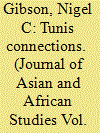

|
|
|
|
|
| Summary/Abstract |
Reflecting on Contested Terrains and Constructed Categories: Contemporary Africa in Focus, a book George Bond and I edited during our work at the Institute of African Studies at Columbia University in the late 1990s, this paper considers the notion of contested terrains, that for George Bond was played out in the scholarship of African studies, in the daily encounters which he had with his colleagues, and in his Zambian research. Bond understood these contestations as continuously operating on and across and often taking place below the surface or at the margins of insititutions. This paper emerged in response to Bond’s invitation to speak about Fanon’s psychiatry writings and Fanon’s critique of sociotherapy on a panel he was organizing at the American Anthropological Association in 2014 (AAA). After he died, the focus shifted to include Bond alongside Fanon and Foucault underscoring the continued need for dialog on the work of three intellectuals—African-American, African Caribbean, and French. The connections and misconnections between Fanon and Foucault is in part the discussion about contested terrains and the willfulness of constructed categories. Indeed, intellectual genealogies, the unknown connections as well as dividing lines was something that interested Bond, the anthrolopologist of the politics of knowledge.
|
|
|
|
|
|
|
|
|
|
|
|
|
|
|
|
| 11 |
ID:
126065


|
|
|
|
|
| Publication |
2013.
|
| Summary/Abstract |
This article extends and critiques Michel Foucault's political sociology of war by taking it beyond its modern subjects. Positioning his work alongside Homer, Heraclitus and Plato, it analyses relations between war, truth and race in the transition from Archaic to Classical Greece. In doing so, it approaches philosophical texts as direct reflections on specific historical experiences of war, making the case for a political theory of fighting as a necessary and under-developed aspect of critical war studies. Such an approach, the article concludes, opens up new scholarly possibilities for the political sociology of war and resources political intervention against war-waging powers whose authority-inside and outside the academy-derives from a supposedly authoritative relation to the history and conduct of fighting.
|
|
|
|
|
|
|
|
|
|
|
|
|
|
|
|
|
|
|
|
|